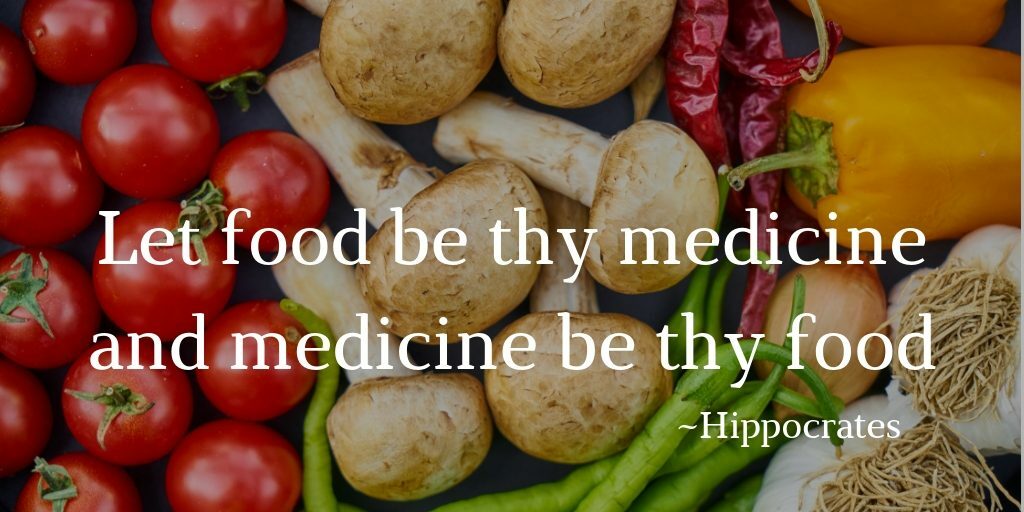Why Nutrition is so Important for our Health and Well-being
Often when a patient consults me for homoeopathic treatment they are surprised at the questions I ask during their first appointment, especially regarding their dietary preferences and habits. I’m very passionate about the impact food has on our health and wellbeing.
“Let food be thy medicine and medicine be thy food”
Hippocrates – Greek Scientist (460BC – 370BC)
In my early 20’s I was diagnosed with an inflammatory bowel disease and discovered through trial and error what foods to avoid and those that helped to ease and finally appear to have eliminated my symptoms. According to the UK Inflammatory Bowel Disease Audit – Royal College of Physicians [www.rcplondon.ac.uk] The number of people suffering with inflammatory bowel disease (IBD), in the UK, has been increasing in recent years and is now estimated to be around 300,000 people. Shockingly 1 in 4 people newly diagnosed with Crohn’s or Colitis in the UK are under 16 years old. [crohnsand colitis.org.uk]
I believe our diet is a major contributory factor in the growing incidence of IBD. Processed food, additives, the use of chemical pesticides, genetically modified food, poor soil quality, mass production of food products, over-eating, is literally consuming us and resulting in various digestive disorders.
“If we could give every individual the right amount of nourishment and exercise, not too little and not too much, we would have found the safest way to health.”
– Hippocrates
How many people do you know who have been diagnosed with Irritable Bowel Syndrome or self-diagnosed themselves as they are experiencing digestive problems? Gastric reflux, heartburn, type 2 diabetes, high cholesterol, high blood pressure, obesity are yet more variations on the same theme where symptoms are concerned, and in my mind, often stem from poor nutrition. Of course the importance of regular exercise, or lack of it, must also be considered a contributory factor to our health and wellbeing.
“Walking is man’s best medicine.”
– Hippocrates
On a recent plane journey I viewed a documentary film called ‘The Magic Pill’ a 2017 Australian film where doctors, scientists and chefs around the globe combat illness with dietary changes. The results in the case studies featured in the film were absolutely amazing and strengthened my resolve that nutrition is so important to our health and wellbeing.
One of my patients has kindly provided a review of their homoeopathic treatment that included some dietary recommendations I introduced:
“I have been suffering with constipation and cramps for years. Almost 4 years ago I was diagnosed with fibroids and 18 months ago IBS (Irritable Bowel Syndrome).The discomfort I suffer can sometimes be unbearable and nothing helps. I have been back and forth the doctors where they are treating me for IBS but aren’t sure if the growing fibroids are aiding my discomfort or not.I have tried many treatments from pills to drinks, but all with unwanted side effects like additional cramping.”
Geri has been helping me through yoga and homoeopathic treatments for this and other symptoms, however, one recommendation made has been very successful for my IBS – ‘Linwoods Milled Flaxseed Sunflower/Pumpkin, Sesame Seeds and Goji Berries’ added to cereal, porridge or yoghurt everyday has made me ‘regular’ for the first time in years. The result is I feel so much happier in myself, more energetic, more relaxed, no bloating, regular and ease of bowel movements. I’ve told family, friends, colleagues, acquaintances who decided to introduce these ‘magic’ seeds into their diet with favourable results too!”
Flaxseeds have been used in Ayurvedic medicine for centuries. Ayurveda means “Science of Life” or “Wise Living”, it is an ancient, approximately 5000 years old, holistic science of health, focusing on maintaining a physically and mentally harmonious state of balance and is often considered a sister science to Yoga.
Those students attending my yoga classes are encouraged to complete a questionnaire to help ascertain what foods, dietary advice, seasonal variations, lifestyle, may suit them best towards restoring and/or maintaining optimum health.
My friend Natasha runs a variety of courses on Ayurveda that I’ve attended in the past and highly recommend – www.gaiaeducation.com, www.gaialifestyle.com, www.gaiahealthnetwork.com.
According to www.healthline.com flaxseeds latin name Linum usitatissimum, means “the most useful.” They are currently considered a “superfood” and their website lists 10 health benefits of these tiny but mighty little seeds, that apparently is backed by science:
- Flaxseeds are loaded with nutrients.
- Flaxseeds are high in Omega 3 fats
- Flaxseeds are a rich source of Lignans, which may reduce cancer risk.
- Flaxseeds are rich in dietary fibre.
- Flaxseed may improve cholesterol.
- Flaxseeds may lower blood pressure.
- Flaxseeds contain high quality protein.
- Flaxseeds may help control blood sugar.
- Flaxseeds keep hunger at bay, which may aid weight control.
- Flaxseeds can be a versatile ingredient.” [www.healthline.com]
In conclusion I know our busy lifestyles can make it difficult to manage our diets but I suggest start by observing what you are eating, when, and if it triggers undesirable symptoms. Try implementing little changes, food swaps, cooking fresh vegetables, especially in season, from scratch, or eating them raw, enjoying plenty of fruit and start exercising, even if it’s just increasing the amount of steps you walk in a day. It needs to be fun too so you are more likely to establish positive habitual patterns in your diet and lifestyle. Awareness, variety and moderation really are key to improving your health and wellbeing.
“Everything in excess is opposed to nature.”
– Hippocrates




